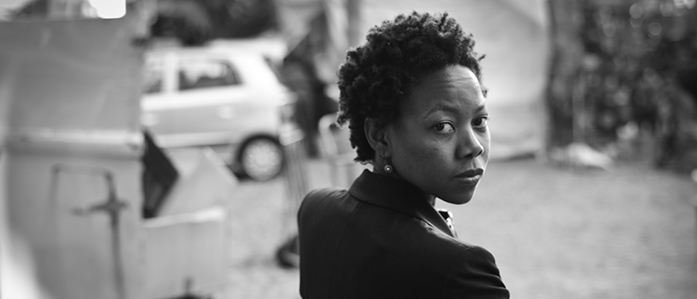By Claire Dietz
“When things fall apart, the children of the land scurry and scatter like birds escaping a burning sky,” writes NoViolet Bulawayo in her début novel, We Need New Names.
Bulawayo, a Zimbabwean writer, will appear at the Iowa Writers’ Workshop for a reading at the Dey House at 8 p.m. Friday.
In the New York Times, the author Uzodinma Iweala described Bulawayo’s novel — a story seen through the eyes of Darling, a young African girl who moves to America — as “brilliant … alive and confident, often funny, strong in its ability to make Darling’s African life immediate without resorting to the kind of preaching meant to remind Western readers that African stories are universal.”
We Need New Names was shortlisted for the Man Booker Prize and the Guardian First Book Award and selected to the New York Times “Notable Books of 2013” list, as well as the Barnes and Noble Discover Great New Writers list.
In an interview with Velamag and Alice Driver, Bulawayo described her process of writing as “a natural instinct,” something she often accomplishes “subconsciously.”
“I find myself writing women’s stories, women at the margins,” Bulawayo said in the interview. “It’s one of those things that you don’t set out to do, but it just happens. I think that speaks to where I’m coming from and where women are — you know the position of women and the kinds of lives that they are living, you know being a woman myself, and that shared compassion, and the awareness, and the importance of their story being told.”
For Bulawayo, who was born with the name Elizabeth Zandile Tshele but adapted NoViolet in college as a pen name, the names of her culture hold great significance. In the Velamag interview, Bulawayo said that “No” means “with” in the southern African language, Ndebele, whereas Violet was her mother’s name, and Bulawayo is the city she grew up in — as she describes it, “the city of [her] people.”
“The names in the book, they are a celebration of my culture,” she said in the Velamag interview. “We are given names that mean something, that speak to something. I notice that most of our literature in English tries to sound English in a sense. You don’t get those kinds of names popping.”
The book also tackles the theme of immigration and poses the question of what it means to move from one country to another.
In an interview with the Los Angeles Review of Books in August 2013, Bulawayo spoke on the personal aspect of this narrative and how it remains as pertinent as ever in today’s sociocultural climate.
“Being an immigrant myself, and having met a lot of immigrants, I’m struck by this experience of transition, something that can be hard to the extent of affecting your relationship to the new country,” she said in the interview. “For Darling, it’s not as seamless because she is recognizing America for what it is, which is not the dream she imagined, while at the same time waking up to the costs, to what has been lost.”



